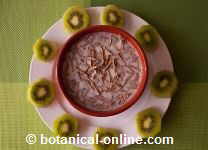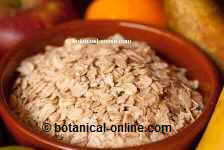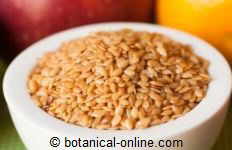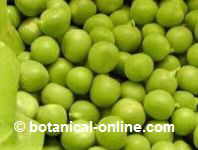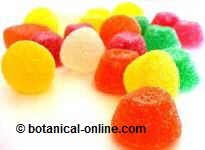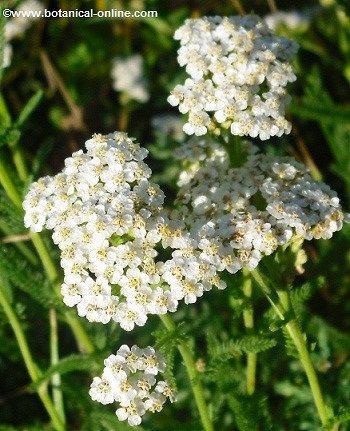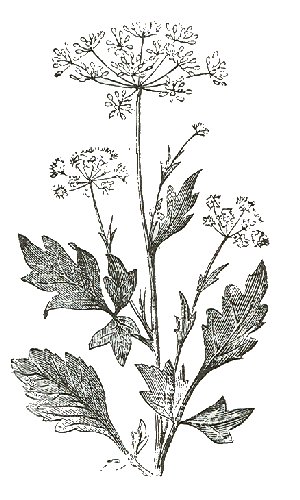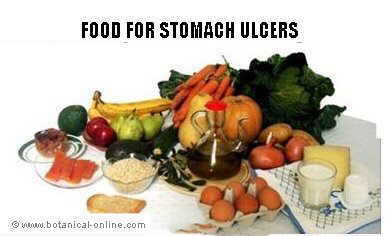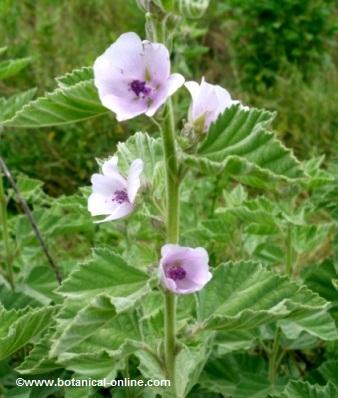Contents
- 1 Diet against chronic and occasional constipation
- 1.1 Food for diet against constipation
- 1.2 RECOMMENDED FOODS AGAINST CONSTIPATION
- 1.3 Dried plums or prunes for constipation
- 1.4 Foods with probiotics to avoid constipation
- 1.5 Chia seeds mucilage for constipation
- 1.6 Figs are very interesting to prevent or treat constipation
- 1.7 Other very interesting food remedies for constipation
Diet against chronic and occasional constipation
Food for diet against constipation
Some foods are very interesting for the control of constipation due to its nutritional composition and properties. People with chronic constipation problems should normally eat some of the following foods.
It must be emphasized that the intake of fiber-rich foods, must be accompanied by abundant hydration. You need to drink plenty of water along with fiber intake for the fiber to be hydrated and exert its effect.
Drinking water will also prevent an intestinal “plug” to be formed.
RECOMMENDED FOODS AGAINST CONSTIPATION
Recommended for control of constipation foods are:
Dried plums or prunes for constipation
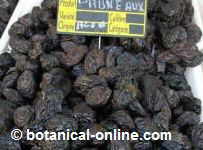
Photo of prunes. Dried fruit and nuts are foods rich in fiber
Dried plums are almost five times richer in fiber than fresh plums, which makes them particularly interesting in the diet of constipation.
There is a famous remedy for constipation that consists on eating two or three dried plums for breakfast. These plums have previously been left to soak in water overnight. You should drink the water of this preparation.
Particularly interesting is the prune juice, for its high content of sorbitol and hydroxy-phenyl satine. It constitutes an authentic natural medicine to cure constipation. With retention problems or intestinal diverticulitis, it is very helpful to eat well chewed dried prunes or drinking the juice from them.
Foods with probiotics to avoid constipation
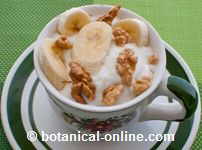
Photo of yogurt with nuts and banana. Yogurt is a food that provides probiotics or lactic bacteria, highly recommended against constipation. Walnuts are rich in insoluble fiber, which stimulates the bowel movement
Type bifidus yogurt. Taking probiotics is highly recommended especially in people with chronic constipation.
Yogurt contains bifidus bacteria Lactobacillus and Bifidobacterium, both species cooperate in improving intestinal health.
Chia seeds mucilage for constipation
The high mucilage content in chia seeds facilitates the passage of food through the digestive tract, producing a cathartic effect (which accelerates defecation). We can take it in different ways:
- Leave a teaspoon of chia seeds in water overnight. Drink it when getting up
- Take 1 teaspoon of chia in the bifidus yogurt, 3 times daily
- Taking chia in salads or other dishes
Figs are very interesting to prevent or treat constipation
Figs are particularly rich in fiber, so they are well known food in case of constipation. The following recipe is a good example of their anti-constipation properties:
Figs recipe for constipation |
Ingredients:
Preparation:
How to take it:
|
Other very interesting food remedies for constipation
- Pineapple: It exerts a regulatory function of the intestine, both for its ability to remove rots as for its laxative properties for constipation.
- Wheat bran: For those who have a special need to evacuate in case of occasional constipation, this can be the right choice, provided they do not use this regularly. Ingest plenty of water to avoid blockages or intestinal plugs.
Most breakfast cereals made from wheat bran are rich in fiber . However, people with inflammatory bowel disease should not use this frequently, since it can irritate the intestines.
Picture of fiber cereal with kiwi. Most fiber type cereals are made with wheat bran
- Kiwi: In addition to providing lots of fiber, because of its pulp and seeds intake, kiwi brings the benefits of vitamin C. This fruit contains more vitamin C than lemons.

Photo of oatmeal. Oatmeal is a very full and rich in fiber cereal
- Oats: It stands out from all cereals because of its high content of fiber, both soluble and insoluble, as well as its wealth in minerals, mainly iron, calcium, zinc, silica, iodine and phosphorus.
- Canary grass: It has traditionally been taken to treat various health problems, including cholesterol control and constipation.
- Baked apple and quince paste: These two foods are very suitable, consumed regularly, to help treat chronic constipation and constipation caused by intestinal diseases (Crohn’s disease, colitis, irritable bowel syndrome). They owe their properties to the regulatory fiber pectin. It is recommended to regularly take in previous cases (1 piece of quince paste quince paste can be frozen and taken all the year, applesauce, etc.).
- Agar agar: Using a teaspoon of agar agar powder diluted in two glasses of cold water forms a gelatin that is eaten to promote bowels movement. If you prefer, you can prepare dishes with this jelly to add more flavor, since agar agar is tasteless.

Flax seeds are rich in mucilage, to accelerate intestinal rhythm and facilitate evacuation
- Flaxseed: Flaxseed is high in soluble fiber mucilage. Highly recommended in the diet against constipation (Sprinkle flaxseed meal or ground seeds over the dishes, pasta, rice, salads, 1 teaspoon on yogurt, etc.)
- Vegetables: Indispensable in the diet against constipation, given their richness in fiber. They also provide many proteins and minerals. The following foods are especially rich in fiber: peas, soybeans, chickpeas and lentils.

Photo of peas. Legumes, because of its high fiber content, are recommended against constipation
- Macadamia nuts: They lubricate the intestines and improve intestinal transit.
- Rhubarb: Because of its content in anthraquinone, it is an effective laxative food.
- Acai: Considering its richness in fiber, it is recommended in the treatment of constipation.
- Bladder cherry: Recommended for its mucilage content, which stimulates the digestive system and help treat constipation. (Eat raw fruits or make a juice with 30 to 60 g of fruits).
![]() More information on laxatives and constipation.
More information on laxatives and constipation.

